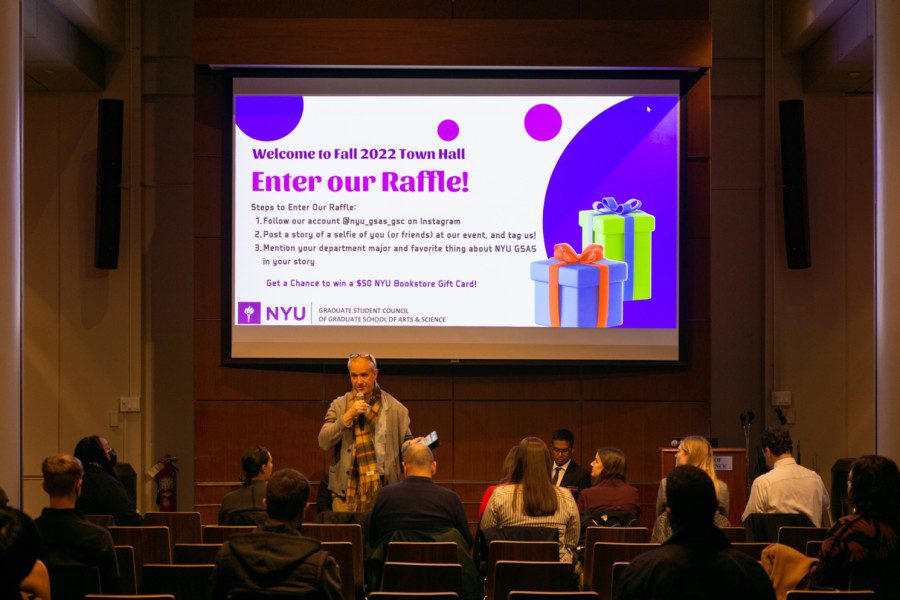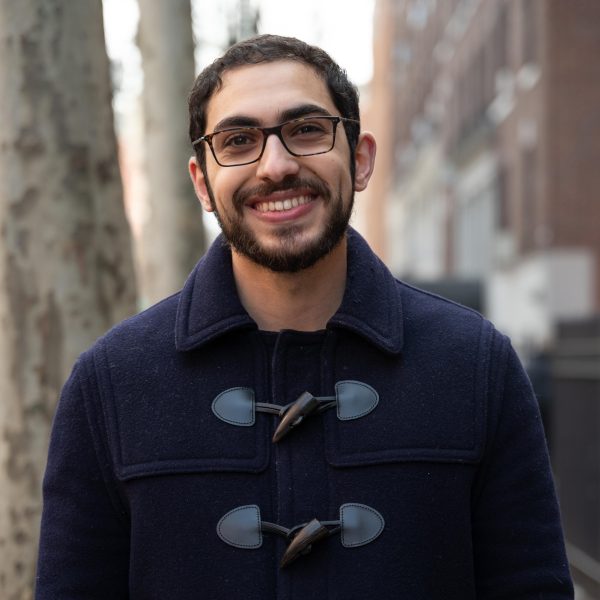Graduate students raise concerns about housing, employment availability at town hall
NYU administrators addressed the financial and academic difficulties that graduate students face during a town hall hosted by the Graduate School of Arts & Science Student Council on Tuesday, Oct. 4.
A town hall for students in the Graduate School of Arts and Science takes place at Hemmerdinger Hall. (Kevin Wu for WSN)
October 6, 2022
NYU administrators spoke about internship restrictions for international students and instructed graduate students on how to navigate scholarships and the housing market at a town hall hosted by the Graduate School of Arts & Science Graduate Student Council on Tuesday, Oct. 4. Students asked GSAS dean Lynne Kiorpes and vice dean David Gresham about scholarship availability and a lack of teaching and research assistant positions at the school.
Randi Amalfitano, the assistant director for Student Affairs at GSAS, said that the graduate student council is working with the school to address housing issues, and is partnering with different departments and the university’s Office of Global Services to expand internship eligibility.
“We’re looking at it both at the GSAS level, but also universally through the university and seeing what other schools are doing, what other departments are doing and ways that we can assist all of our international students,” Amalfitano said. “I want to make sure all our students really feel heard and feel that they have an outlet to express their concerns in a productive manner.”
Barriers to off-campus work for international students
International students who are on an F-1 visa — documentation that allows a student to stay in the United States while working toward a degree — can apply for curricular practical training, which is off-campus employment that is relevant to a student’s studies. Students who have F-1 visas are limited to working 20 hours per week during the academic year.
Curricular Practical Training authorization from a university department is required for many international students to access off-campus work. Students must also submit a form to the Office of Global Services, which assists students who are navigating visa requirements, with their expected dates of employment, a point of contact within the department and a record of their presence in the country in order to receive approval.
Aakash Bhunia, the president of the graduate student council, said that 70% of students at GSAS are international, meaning they depend on university authorization in order to fulfill internship requirements during their time at NYU.
“It’s very important that we will be getting some support,” Bhunia said. “It’s a great way to start — expanding CPT and giving more opportunities to international students.”
Scholarships and fellowships
NYU administrators also discussed how to improve scholarship availability for GSAS students.
GSAS offers students merit-based scholarships awarded by individual departments, which are mainly given through the GSAS Tuition Incentive Program. The program allows students with awards of $13,000 or more from external university-recognized institutions to receive a scholarship of up to the same amount from NYU. Students with external scholarships under $13,000 can apply to have up to half of their award matched rather than the full amount.
David Giovenella, the associate dean for graduate enrollment services, said that any graduate student — domestic or international — is eligible to apply for the program.
“We’re the only school that has it,” Giovenella said. “I’ve never come across another one. If you find [an external scholarship] now, apply and we will give it to you.”
The university connects GSAS students with fellowship opportunities, some of which are from external programs, and provides advising services to students applying for fellowships and academic awards. Kiorpes said that since fellowships are often funded by donations, their availability depends on where donors want their money to be allocated.
“There’s a perceived imbalance because student A will get money and student B will not,” she said. “We can only do what the donor intended, but what the GSAS routinely does is work with the university development team to try and raise more money for scholarships. We try to get people to donate generally to scholarship funds so that we can spread it around.”
While graduate students can apply for on-campus work as a teaching assistant, research assistant or adjunct faculty member, Bhunia said that there is an insufficient number of positions available. He noted that many international students have demanded more access to these jobs since they are considered on-campus and do not require CPT authorization.
Housing cost and availability
Graduate student council members also raised concerns about scarce graduate student housing amid the rising living costs in New York City. Bhunia asked administrators about the resources that graduate students can utilize to navigate the housing market.
“Subsidized housing for students is a very valuable resource that has been helpful for GSAS students, but at the same time, many masters students suffer from a lack of housing support,” Bhunia said.
NYU’s Lease Guaranty Program helps GSAS students overcome high income requirements for renting, including a common prerequisite that renters must make a yearly salary of 40 times as much as monthly rent costs. Most graduate students live off campus, and the university encourages all graduate students to look for off-campus housing, according to NYU.
In addition to assistance through the program, NYU provides graduate students with two on-campus housing options — Washington Square Village and Stuyvesant Town. While both residences prioritize first-year students due to limited availability, the StuyTown option is restricted to students in specific graduate programs.
Kiorpes said that the university has limited resources for housing, and available units are given to students on a first come, first served basis, which has made it difficult for graduate students to find housing. She added that she has spoken with NYU president Andrew Hamilton about the challenges facing graduate students who look for housing.
“Housing resources for students at the university go to undergraduates, and that’s just the way it is,” Kiorpes said. “We have to work with what we have.”
Contact Yezen Saadah at [email protected].
























































































































































